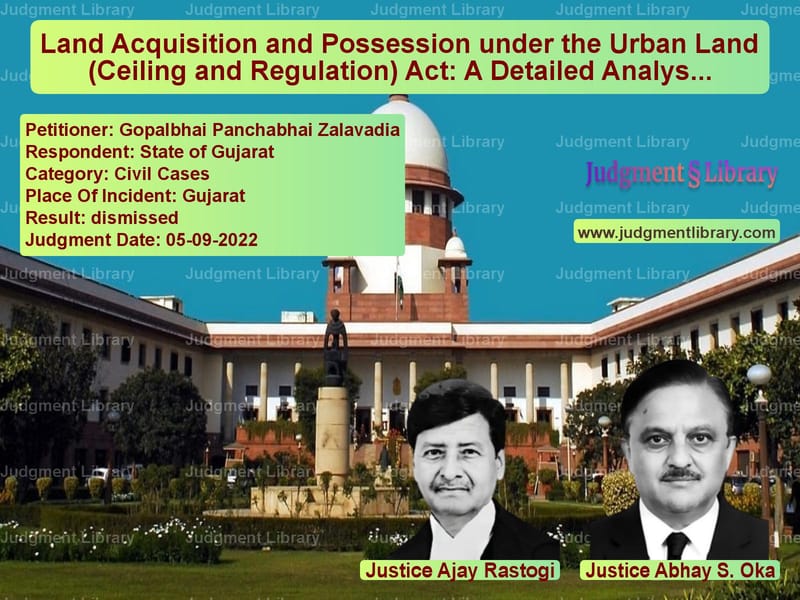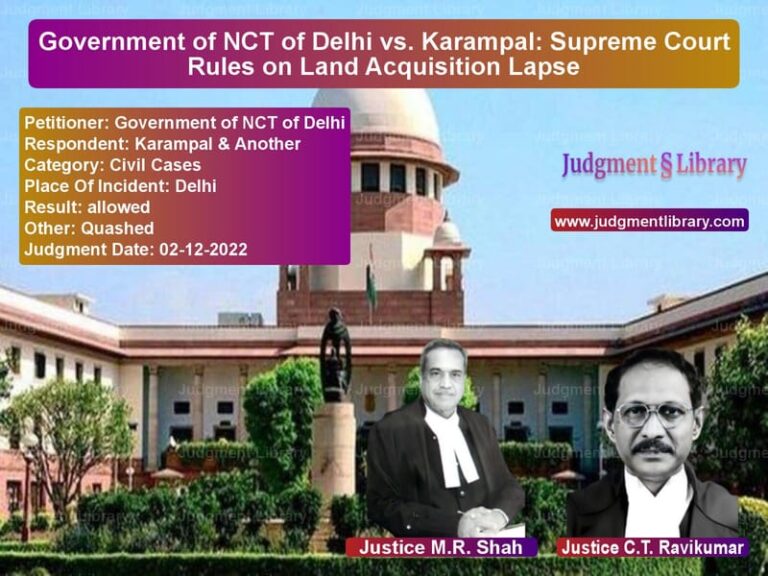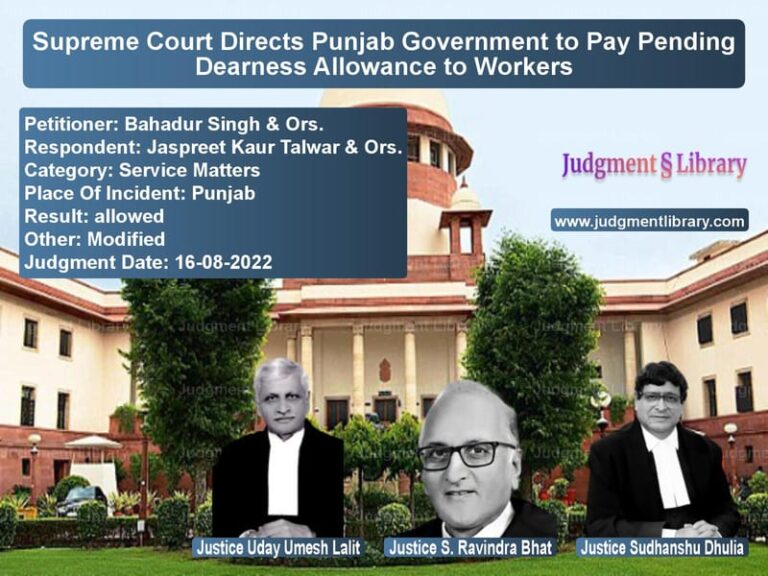Land Acquisition and Possession under the Urban Land (Ceiling and Regulation) Act: A Detailed Analysis of Gopalbhai Panchabhai Zalavadia v. State of Gujarat
The case of Gopalbhai Panchabhai Zalavadia (dead) through LRs v. State of Gujarat deals with a land acquisition dispute, specifically related to the application of the Urban Land (Ceiling and Regulation) Act, 1976 (the Act). The appellant, Gopalbhai Panchabhai Zalavadia, contested the State’s acquisition of his agricultural land, claiming that the procedure followed by the government was flawed and the compensation paid was insufficient. The central issue in this case was the possession of the land, which the government claimed to have taken in accordance with the Act, and the subsequent denial of the appellant’s claim for restitution of possession. The case examines the legality of government actions under the Act, the importance of due process in land acquisition, and the legal implications of mutation orders. This blog post delves into the legal arguments presented by both parties, the Court’s reasoning, and its final judgment.
Background of the Case
The dispute began when the government initiated proceedings under the Urban Land (Ceiling and Regulation) Act, 1976, to acquire land that was deemed surplus in the hands of the appellant, Gopalbhai Panchabhai Zalavadia. The appellant had submitted a form in 1976 declaring the land as agricultural, which was allegedly not considered when the government determined that 21,615 sq. meters of land were surplus. The Deputy Collector passed an order in 1987, declaring this land as surplus and took possession of it in the presence of Panchas. The compensation for this land was determined in 1988 under Section 11 of the Act. However, the appellant did not accept the compensation and later sought restitution of possession. The case was initially heard in the Land Tribunal, which upheld the government’s actions. The High Court of Gujarat dismissed the appeal, confirming the government’s right to take possession and the validity of the compensation. The appellant then approached the Supreme Court.
Read also: https://judgmentlibrary.com/benami-ownership-and-proving-of-title-pushpalata-vs-vijay-kumar/
Petitioner’s Arguments
The appellant, Gopalbhai Panchabhai Zalavadia, presented several arguments in his defense:
- Failure of Proper Procedure: The appellant argued that the government did not follow the due process prescribed under the Act when acquiring the land. He pointed out that the possession was taken without sufficient notice and that the government did not comply with the required procedures under Sections 10(1), 10(3), and 10(5) of the Act.
- Non-Acceptance of Compensation: The appellant claimed that he did not accept the compensation offered by the government, as the valuation of the land was too low. He argued that he was not fairly compensated for his land, as the price was not determined according to the prevailing market rates.
- Restitution of Possession: The appellant contended that the possession of the land should be restored to him, as the acquisition process was flawed. He argued that the order of the Land Tribunal and the subsequent mutation in the name of the government was legally unjustifiable, and he sought to reclaim possession of the land.
- Sympathy for Agriculturists: The appellant’s counsel emphasized the hardships faced by the appellant and his family, as the land was the only source of livelihood. He argued that the land acquisition deprived the appellant of his livelihood, and the injustice caused by the government’s actions needed to be remedied by restoring possession.
Respondent’s Arguments
The State of Gujarat, represented by the respondents, raised the following counterarguments:
- Adherence to Procedure: The respondent argued that the acquisition process followed all necessary procedures under the Act. They pointed out that the Deputy Collector took possession of the land in 1987 after conducting the prescribed inquiries and that compensation was paid in accordance with the law. The respondents claimed that the government’s actions were legally sound and that all procedures were followed as per the statutory provisions.
- Finality of Land Tribunal’s Order: The respondent contended that the decision of the Land Tribunal, which upheld the government’s actions and validated the compensation, was final and had not been contested by the appellant. They emphasized that the appellant’s claim for restitution was barred due to the finality of the Tribunal’s decision and that the appellant had failed to raise any objections at the appropriate stage.
- Restitution Not Justified: The respondents argued that the appellant’s claim for restitution of possession was not justified, as the possession had been taken in accordance with the law, and the compensation had been duly paid. They maintained that the appellant had not presented any evidence to challenge the factual findings regarding the possession of the land or the validity of the compensation.
- Role of Mutation: The respondents argued that the mutation of the land in favor of the government was legally valid and that the appellant’s claim for the return of possession was baseless. They claimed that the mutation reflected the proper legal process and that the appellant had no further right to the land after the government took possession.
The Court’s Reasoning
The Supreme Court, after considering the arguments presented by both parties, made the following observations:
- Legality of Possession Taken by the Government: The Court noted that the government had followed the procedure outlined in the Urban Land (Ceiling and Regulation) Act, 1976, and had taken possession of the land in the presence of Panchas. The Court observed that the process was conducted according to the requirements of Section 10(1), 10(3), and 10(5) of the Act, and the appellant had not raised any objections during the process.
- Finality of Tribunal’s Order: The Court emphasized that the order of the Land Tribunal, which upheld the government’s actions, had attained finality. The Court noted that the appellant had not challenged the findings of the Tribunal at any stage and that the legal process had been followed. The Court held that the appellant could not now claim restitution based on procedural technicalities.
- Restitution of Possession: The Court observed that the appellant’s claim for restitution of possession was based on the argument that the government’s actions were flawed. However, the Court concluded that the appellant had failed to provide any concrete evidence to substantiate this claim. The Court found that the government had taken proper possession of the land and had paid compensation accordingly, and no further action was warranted.
- Sympathy for the Appellant: While the Court expressed sympathy for the appellant’s situation, particularly his loss of livelihood, it made it clear that legal decisions must be made based on facts and law, not on emotions. The Court noted that once the land had vested with the government and compensation had been paid, the appellant had no further claim to the land.
- Effect of Repeal of the Act: The Court took into account the repeal of the Urban Land (Ceiling and Regulation) Act, 1976, but noted that this did not affect the rights of the parties in this case. The Court held that the repeal did not change the fact that the government had already taken possession of the land and paid compensation in accordance with the law.
The Court’s Decision
The Supreme Court ruled as follows:
- Dismissal of the Appeal: The Court dismissed the appeal filed by the appellant, upholding the decision of the High Court. The Court found that the government had legally acquired the land, paid compensation, and that the appellant’s claim for restitution of possession was not justified.
- Finality of Tribunal’s Order: The Court affirmed that the findings of the Land Tribunal regarding the acquisition and compensation had attained finality and that the appellant’s claim for restitution was without merit.
- No Costs: The Court did not award costs to either party in this case, acknowledging the complexity of the legal issues involved.
Conclusion
This case highlights the procedural requirements of land acquisition under the Urban Land (Ceiling and Regulation) Act, 1976, and the importance of adhering to legal procedures. The Supreme Court’s decision reinforces the principle that once possession is taken under the law, and compensation is paid, the landowner’s rights are extinguished, even if the Act is later repealed. The case also underscores the finality of tribunal decisions and the need for appellants to challenge legal rulings at the appropriate time to preserve their rights.
Petitioner Name: Gopalbhai Panchabhai Zalavadia.Respondent Name: State of Gujarat.Judgment By: Justice Ajay Rastogi, Justice Abhay S. Oka.Place Of Incident: Gujarat.Judgment Date: 05-09-2022.
Don’t miss out on the full details! Download the complete judgment in PDF format below and gain valuable insights instantly!
Download Judgment: gopalbhai-panchabhai-vs-state-of-gujarat-supreme-court-of-india-judgment-dated-05-09-2022.pdf
Directly Download Judgment: Directly download this Judgment
See all petitions in Property Disputes
See all petitions in Contract Disputes
See all petitions in Damages and Compensation
See all petitions in Landlord-Tenant Disputes
See all petitions in Judgment by Ajay Rastogi
See all petitions in Judgment by Abhay S. Oka
See all petitions in dismissed
See all petitions in supreme court of India judgments September 2022
See all petitions in 2022 judgments
See all posts in Civil Cases Category
See all allowed petitions in Civil Cases Category
See all Dismissed petitions in Civil Cases Category
See all partially allowed petitions in Civil Cases Category







